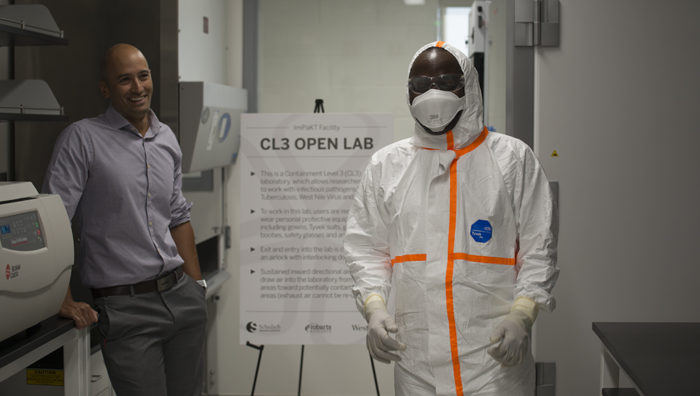By combining imaging equipment within a high-level containment building, a new research facility in London will allow researchers to investigate infectious pathogens, including HIV.

The Imaging Pathogens for Knowledge Translation facility (ImPaKT) officially opened at Western University on Monday.
“I’ve been in facilities like this around the world,” said Western professor and HIV researcher Eric Arts, PhD, “but none of them have the capabilities that we possess in this facility.”
Arts told Global News Radio 980 CFPL that he’s working alongside world-renowned Dr. Gary Kobinger of Laval University to develop an HIV vaccine. Kobinger was one of the co-discoverers of the Ebola drug ZMapp.
“Right now we’ve partnered together and he’s leading a team of us. We’re developing an HIV vaccine based on the same platform he used for the Ebola vaccine. We’re in testing right now and this type of facility will allow us to really delve deep into whether this vaccine can be successful for HIV.”
Work on ImPaKT involved contributions from more than a dozen scientists and researchers across Western University and the facility was funded by Western’s Schulich School of Medicine & Dentistry and a significant grant from the Canada Foundation for Innovation, according to a release.
Arts stressed that most high-level containment facilities don’t also have the kind of imaging equipment that ImPaKT offers.
“In order for us to study dangerous pathogens like HIV or Zika or West Nile or MRSA, we need to do it in a very safe environment. As a consequence, because we work in these highly contained laboratories that are very expensive to construct, most facilities don’t also want to incorporate the really expensive imaging equipment that is used most commonly across all diseases today.”
The university says the goal is for ImPaKT, and the scientific expertise at Western, to be used by scientists worldwide to advance work in the crucial research area of infectious pathogens.
WATCH: (July 19, 2019) Montreal HIV research group receives grant
_848x480_1573721155726.jpg?w=1040&quality=70&strip=all)







Comments